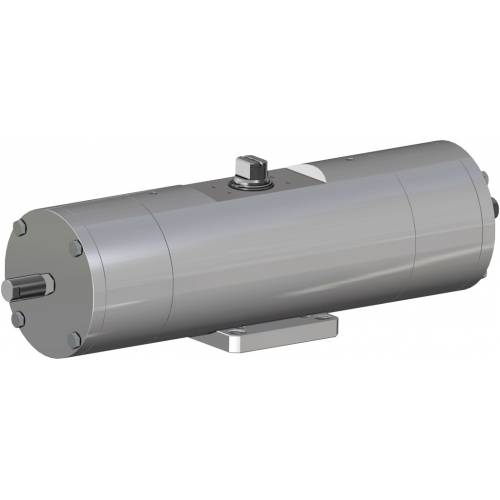316 FROM BAR DOUBLE ACTING AND SPRING RETURN PNEUMATIC ACTUATOR COMPONENTS
|
| Pos | Denomination | Q.ty | Material |
| 1 | Cylinder | 1 | Stainless steel |
| 2 | Piston | 2 | Aluminium alloy |
| 3 | Cap | 2 | Stainless steel |
| 4 | Shaft | 1 | Stainless steel |
| 5 | Scotch yoke | 1 | Steel alloy |
| 6 | Bearing shaft | 1 | Acetalic resin |
| 7 | Upper shaft support | 1 | Acetalic resin |
| 8 | Bearing shaft | 1 | Acetalic resin |
| 9 | Ext.elastic pin | 1 | Steel alloy |
| 10 | Int.elastic pin | 1 | Steel alloy |
| 11 | Steel bush | 2 | Steel alloy |
| 12 | Rotative sleeve | 2 | Steel alloy |
| 13* | Dynamic seal | 2 | Plyurethane |
| 14* | Support disk | 4 | P.T.F.E. carbo-graphite filled
|
| 15* | O-ring | 2 | Nitrilic rubber |
| 16 | O-ring | 1 | FKM |
| 17 | Thrust bearing | 1 | Acetalic resin |
| 18 | Washer | 1 | Stainless steel |
| 19 | Seeger | 1 | Stainless steel |
| 20 | Lower shaft support | 1 | P.T.F.E. carbo-graphite filled
|
| 21 | O-ring | 1 | FKM |
| 22* | GD O-ring | 2 | Nitrilic rubber |
| 23 | Screws | 8 | Stainless steel |
| 24 | Grub screws | 2 | Stainless steel |
| 25 | O-ring | 2 | Nitrilic rubber |
| 26 | Adjusting nut | 2 | Stainless steel |
| 27 | Fixing flange | 1 | Stainless steel |
| 28 | Screws | 4 | Stainless steel |
| 29* | GS O-ring | 4 | Nitrilic rubber
|
| 30 | Cylinder spacer | 2 | Stainless steel |
| 31 | Spring | 2 | Steel alloy |
| 32 | Spring cap | 2 | Aluminium alloy |
| 33 | Spring loading screw | 2 | Stainless steel |
| * Components of spare part kit |

